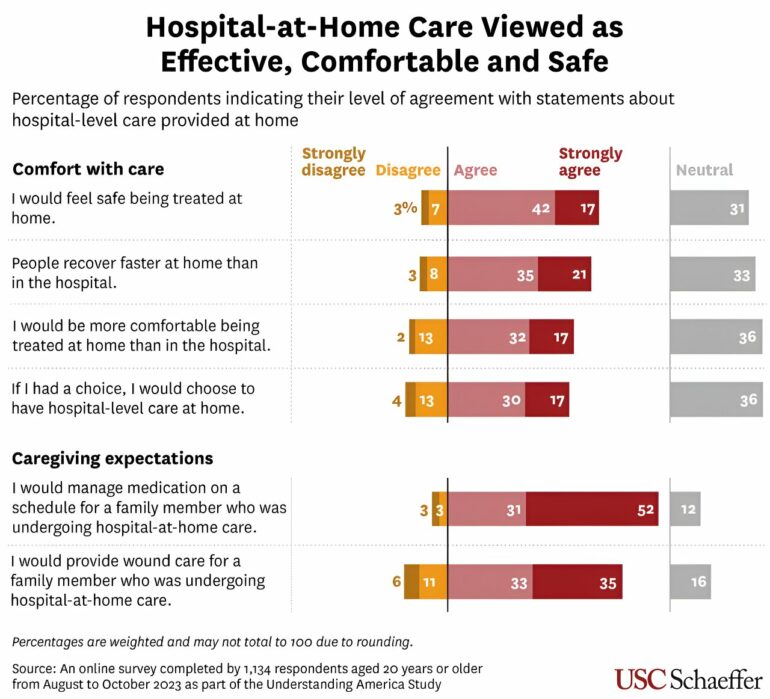Hospital-level care provided in a patient’s own home is appealing to a majority of people for its convenience, comfort and effectiveness, according to a USC Schaeffer Center study.
The study, published in JAMA, found that most survey respondents felt they would recover faster if cared for at home, rather than in the hospital, and that they felt safe being treated at home.
Researchers say their study provides important insights about patient and family preferences as policymakers weigh whether to extend a pandemic-era program that allowed hospitals to provide care at home.
“Patients, of course, want the best-quality care, but often prefer to be at home, especially if technology allows them to work closely with their physician team toward recovery,” says Melissa A. Frasco, research scientist at the Schaeffer Center.
The research also found that 82% of respondents felt comfortable with managing a patient’s medications at home, and 67% reported willingness to provide more in-depth care such as wound care.
Hospital-level care can often be provided at home for many patients with acute conditions using remote patient-monitoring tools, daily in-person or telehealth visits by clinicians, and in-home infusions. Previous studies have shown that such care can reduce readmissions and lower costs compared with traditional hospital care.
The researchers used a sample of the Understanding America Study to survey about 1,100 respondents about their preferences. Responses showed that 47% agreed that hospital-at-home care was an acceptable alternative to inpatient care.
Meanwhile, only about 17% felt negatively about hospital-at-home care’s merits, while 36% were neutral on the issue. Further, 56% agreed—including 21% who strongly agreed—that people recover faster at home than in the hospital.
The Centers for Medicare & Medicaid Services (CMS) temporarily authorized at-home care services during the COVID-19 pandemic under the Acute Hospital Care at Home waiver. Congress extended the waiver through December 31, 2024, with a requirement that CMS comprehensively study care quality before it would approve reimbursements over the long term. Currently, 322 hospitals across 37 states have been approved to provide at-home care.
“Our findings offer valuable information for policymakers and health systems as they navigate a new landscape of post-pandemic patient care,” says co-author Erin L. Duffy, director of research training at the Schaeffer Center.
“Extending reimbursement for hospital-at-home care could go a long way toward reducing costs and improving outcomes, benefiting all parties involved.”
Acceptability of hospital care at home did not vary across sociodemographics, health insurance coverage, health status, prior hospitalizations or telehealth use, the researchers found.
In addition to Duffy and Frasco, the study was co-authored by Schaeffer Center Co-Director Erin Trish.
More information:
Melissa A. Frasco et al, Acceptability of Hospital-at-Home Care and Capacity for Caregiver Burden, JAMA (2024). DOI: 10.1001/jama.2024.10035
Provided by
University of Southern California
Citation:
Study: Americans find hospital-at-home care appealing and safe (2024, July 8)



